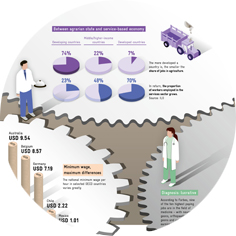Interview employment
‘Africa is on the rise’
How would you assess Africa’s economic performance?
Africa is on the rise – for various reasons. We are now performing better with regard to some very important fundamentals, namely trade, entrepreneurship and social awareness. We have been improving on all three. The African people are more determined on what kind of leadership they want. We have seen a number of governments pushed out of power over the past one or two years. Take Zimbabwe, South Africa and the Gambia. Africa is also moving from being an exporter of raw materials and resources to added-value-products and manufacturing. All of this makes me optimistic.
But you also have countries falling back into crisis and recession …
We follow natural development cycles. Granted, we are still in early stages, but we are moving forward. You can now see more stable growth in many African countries such as Nigeria. Conflicts are being resolved, and education and health care are being prioritised more.
Yet unemployment is high, particularly among young people. What is the best way to create more jobs?
Indeed, many people are unemployed. Without the right skills, it is very difficult for them to find jobs, even for university graduates. Because most young people do not have work experience, they lack certain business skills and do not know how to be relevant for the workplace. And many of them do not know how to start or manage a business.
How could their skills be improved?
A lot of young people are training themselves by leveraging the internet, which offers many useful resources. Another way is for private firms and public institutions to work hand in hand to teach these skills. I am not only talking about vocational training, but also basic competences on how to manage a business, on accounting and financing, on how to communicate. We have to empower young people to increase their employability and their ability to start or manage a business. For example, the Lagos State Government has a programme where undergraduates are trained by volunteer faculty members on workplace skills. Many private companies including Siemens have supported this programme – and it is quite successful.
Apart from skills, what else is needed to fight unemployment?
Another important factor is financing. We need institutions that give low-interest loans to younger people so that they can start a small business. In most economically successful countries around the world, small enterprises have played a crucial role. Sometimes they even grew from a home office to a multinational company. So we need credit programmes for young people in Africa with feasible interest rates.
What role does digitalisation play?
It plays a huge role and makes a great difference. Firstly, companies can leverage the internet of things to manage, operate and maintain their assets more efficiently. Secondly, entrepreneurs can increase their revenue and reduce cost with digital solutions and, in that way, expand and create jobs. Plus, Africans have the right mindset for it. They are passionate about the latest technical innovations and embrace them as fast as possible, from mobile phones and all kinds of apps to digital solutions in manufacturing.
In what industries do you see particular opportunities to create new jobs?
The energy sector, because Africa has huge potential to use fossil fuels and renewables to close its massive electricity gap. Only 40 per cent of Africans have a reliable power supply. I also see opportunities in agriculture, food processing, manufacturing and the increasing leveraging of digital solutions across these industries.
THE INTERVIEWEE
Onyeche Tifase
Tifase started her career at Siemens in the United Kingdom before working for the group in Germany and the USA. She has been the Managing Director/CEO of Siemens Nigeria since 2014. In 2018, Tifase took part in the third ‘Germany in the Eyes of the World’ study, in which GIZ asks people from various countries about their perceptions of Germany.
published in akzente 3/18
Learning for life
Employment
New ways to tackle the global jobs crisis
Essay employment
A long way to go
Infographic employment



